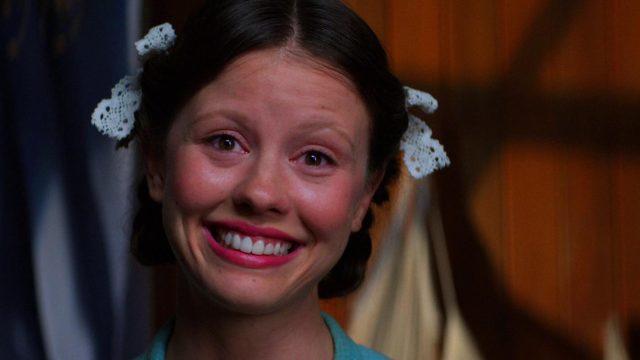I ended my review of X by praising Mia Goth and saying that it’s no wonder that Ti West was spinning a trilogy around her. X is good, but it’s not the kind of film that needs a series; Mia Goth, on the other hand, is exactly the kind of performer who needs and deserves this kind of spotlight, in a role that lets her be damaged, vulnerable, vicious, romantic, and murderous all at the same time. Pearl was made for her, literally, and that’s a good thing. It’s a star vehicle of a kind that hardly exists anymore (perfectly, poignantly, it’s the exact thing Goth’s character longs for, and will never get)–its thorough devotion to its lead actress is as nostalgic and bold as its bright colors and stylized song-and-dance sequences.
Pearl is set in 1918, when Pearl–one of Goth’s two characters in X–is still young and hopeful, chafing at the restrictions of her life on her parents’ farm. She married the sweet, secretly-from-money Howard partly to escape all this, but Howard’s WWI deployment has stranded her back in her childhood, where she’s once again at her strict mother’s beck and call, being reminded of her chores and punished for buying penny candy on the way home from her errands.
(Actually, the penny candy was a lie: she went to a picture show. With Pearl, it’s always the pictures, which offer her a gauzy daydream of escape. If only she could be a dancer like the ones up on the screen, everything that’s broken inside her would be fixed.)
More than anything, Pearl would tell you, she’s afraid of becoming her mother (Tandi Wright). She doesn’t have enough empathy to understand that her mother, worn haggard by everything she has to deal with–a paralyzed husband in constant need of care, a struggling farm, and, of course, a daughter whose savage unpredictability means she can’t be counted on–doesn’t want any of this either. The tension between the two of them slowly mounts, culminating in an incredible scene where Pearl’s mother reveals that she knows something is very wrong with her daughter. And eventually, she tells Pearl, other people will see it too.
Pearl fantasizes about escape. If Howard doesn’t come home to her soon, all her pent-up frustration (both sexual and imaginative) will explode. If she has to, she’ll save herself–have a discreet affair with a “bohemian” projectionist (David Corenswet) and find a job in a state dancing troupe designed to lift morale. You can imagine an alternative movie where these avenues of escape work, but I don’t think you need me to tell you that that isn’t this movie. Not for long, anyway. And, unsurprisingly, the more desperate Pearl is for escape, the more erratic and dangerous she is when she’s thwarted.
Pearl is much more of an intense, gaudy, gory character study than a horror movie, but it still has some excellent, hard-to-take bits of suspense-building. The alligator in the pond provided the most memorable visual in X, and here it provides the most agonizing sequence, where Pearl–who has already brought “Theda” a freshly-killed goose–parks her father’s wheelchair on the edge of the dock and monologues wistfully about how she’d have an easier time leaving home if she didn’t feel like she was abandoning him. Her father (Matthew Sunderland) does some incredible nonverbal acting, here and elsewhere, making his absolute terror sickeningly palpable even as his character can barely move.
The film is also frequently funny, getting a lot of mileage out of both Pearl’s thorough commitment to her fantasies–seducing a neighbor’s scarecrow, a stand-in for the projectionist, only to panic and scream, “I’m married!” at it–and other people’s quietly horrified reactions to her after she’s revealed too much. There are two separate “oh, wow, look at the time, I guess I have to run” responses in this that are both excellent.
Really, nothing exemplifies the film more than the screenshot I unsurprisingly chose for the header image. It’s become the signature shot of the movie–a desperate, strained smile Pearl holds and holds and holds, a smile she’s preparing herself to hold for the rest of her life if she has to, if that’s what will ensure that she’s loved, a smile that clearly hurts her, a smile that does absolutely nothing to rectify the horrors she’s committed. It’s hilarious. It’s awful. And the unresolved tension of it makes it the perfect stand-in for Pearl–and for Pearl.
Pearl is streaming on Amazon Prime.

